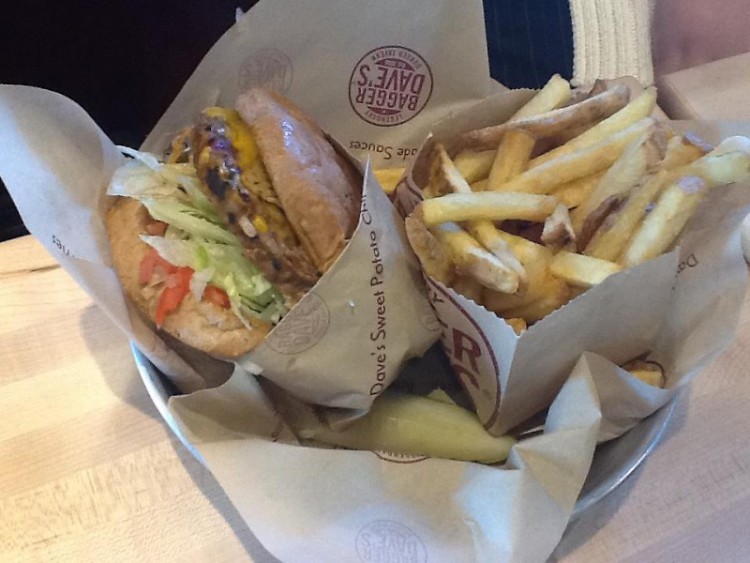Recently Bagger Dave’s held a media event at their newest restaurant in Grandville. The press release offered “the opportunity to check out the restaurant and learn more about this rapidly expanding Michigan-grown company” and “the 33 local suppliers who we work with to supply our ingredients and products.”
Disclaimer: I do not pretend to eat only local food. I do prefer it, and I make the choice to eat at locally sourced restaurants as much as possible, but I am not a purist.
I emailed Christine Picchietti, Vice President of Sanderson & Associates, who was coordinating this event, to find out who the 33 local suppliers were.
“I spoke with my contact at Bagger Dave’s and was able to pull a few local suppliers for you," she reponsded. "Typically, they don’t share supplier information because they don’t want the competition to steal their idea! However, they’re happy to share a few with you: Van Eerden, is a Grand Rapids based foodservice company used for all of the company’s distribution. They also partner with Brewery Vivant in Grand Rapids, Founders Brewing Company in Grand Rapids, Shorts Brewing Company out of Bellaire, and Bell’s Brewery out of Kalamazoo as vendors for their Local Craft Beer initiative.”
This did not add up for me. Typically, the restaurants I visit post the farmers they work with on the wall or print it in their menu. There didn’t seem to be any concern for “stealing” vendors. Additionally, a foodservice company isn’t what I typically think of when I think about local sources. Clearly, my definition of local and Bagger Dave’s definition of local are different. I realized that I had stumbled into what is, in my opinion, a case of local-washing.
Unfortunately, this phenomenon is not limited to restaurant chains. Some of my friends who source local restaurants, who have asked to remain anonymous, say that some restaurants claim to offer their products but the quantities that are purchased clearly indicate that other sources are being used in addition to theirs.
So how can a buyer beware?
“Specifically with food, an easy way to beware is to make sure what is being offered as local is actually in season,” recommends Andrea Gray Veldman, who is the Secretary of Slow Food West Michigan and also on staff at The Kitch’Room. “Ask for the specific source and don't be afraid to check in with the sources, ask if they sell to the provider and in what quantities.”
Another way to evaluate restaurants is to apply the Slow Food Snail of Approval (SoA) standards of Quality, Authenticity, and Sustainability.
“Take a look at the standards, and ask yourself: Do the foods (how they taste, where they come from, what culture or tradition they represent), and/or the processes (in-house curing, farmstead cheesemaking, baking in a wood-fired oven), and/or the business practices (using local ingredients, featuring fair-trade products, informing the public where the food comes from) help move us toward a food system that is better, cleaner, fairer? You may also have to ask some questions of a proprietor, or chef, to understand exactly what they’re doing and why. 'Where do the ingredients come from?' 'What do you do when strawberries go out of season?' 'Why do you make it that way?' To fully appreciate the food we eat, we need to enjoy it, and we also need to know something about it,” says Cindee Dresen, President of Slow Food West Michigan.
However, Dresen also feels it’s important to recognize that no restaurant is perfect.
“The Snail of Approval standards talk about food that makes ‘significant contributions to Quality and/or Authenticity and/or Sustainability.’ The American food system is a long, long way from the good, clean and fair system that Slow Food envisions," she says. "In order to help us get there, we want to recognize those who are making real steps in the right direction.”
Indeed, making steps in the right direction is all we can ask of anyone. Even though I feel a bit misled when Bagger Dave’s claims to be “local,” I will still eat there on occasion, mostly because there are times one doesn’t feel like driving across town to eat at a truly locally sourced restaurant, but also because I appreciate their Michigan microbrew selection.
In the end, decisions about what one eats are highly personal. Make sure it’s an informed decision, and don’t be fooled by advertising.
The Rapidian, a program of the 501(c)3 nonprofit Community Media Center, relies on the community’s support to help cover the cost of training reporters and publishing content.
We need your help.
If each of our readers and content creators who values this community platform help support its creation and maintenance, The Rapidian can continue to educate and facilitate a conversation around issues for years to come.
Please support The Rapidian and make a contribution today.


